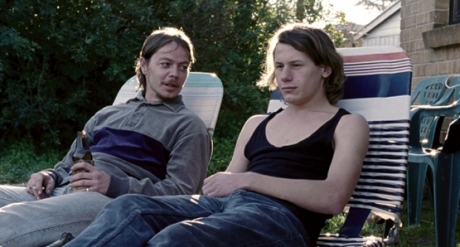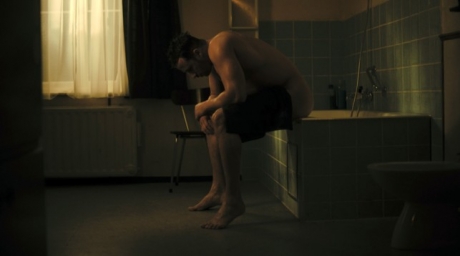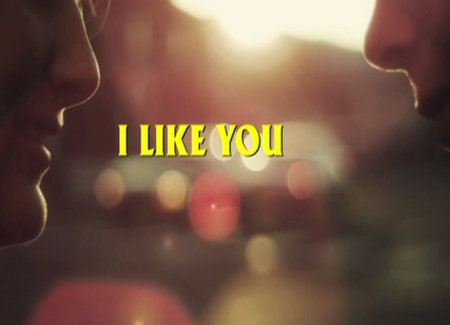I feel like I picked a lot of sex at this year’s San Francisco Independent Film Festival. Maybe because it’s February, maybe because it’s leap year, maybe it’s because of my hormones, but there was so much perversity with over 80 indie choices that I ended up going for the taboo, the wasted, the awkward, and the cute. I think I just described San Francisco. The festival selections ranged from B-rated horror to experimental documentary to Oscar contender. Unlike other film festivals, which are backed by loads of cash and some random old dude named Robert Redford, the SF Indie Fest is so low-budget, so, well, ‘indie’ that you kind of have to rely on well-written blurbs to tell you what to see. It’s surprising to me that for such a nutcase of a city there isn’t more of an uproar when film festivals roll in. This year, I felt limited to only a handful of weirdos, and I wasn’t really interested in seeing whatever else was offered. But at least I got to watch a lot of people who weren’t me suffer onscreen from sexual hangups, small-town brutalities, and crappy screenplays. Lots of miserable flesh to be had.
Snowtown (Justin Kurzel)

I wasn’t familiar with the Snowtown murders until I came home from the screening for Kurzel’s Snowtown and read
the Wikipedia. Holy shit. The film doesn’t even come close to the gut-sick details contained within this one page of internet information. However, the film does manage to push you so far into the void of watching two mentally ill men feed off each other’s fucked wanting that you’re not sure the outside world will still be there when you walk out of the theater. My friend and I sat next to a couple, and any scene involving incestuous rape (there are a few) and/or torture (quite a bit) provoked the girlfriend to shift in her seat and hotly whisper, “Why did you bring me to this?” The same question could be asked of the filmmaker’s intention to depict abuse after abuse of a young schizophrenic teenage boy and his eventual turn to murder without giving much context beyond a sexually abusive childhood. Why did you bring me to this if there’s nothing gnawing underneath the surface of cruelty? Where is the complexity of a calmness hiding inside all of this madness? Some attempt is made with a mother and younger brothers, but they’re as flat as the landscape, and so we are left to watch a caricature of evil, rather than something that pulsates. You’ll probably get more from the Wikipedia article than you will the film.
The Color Wheel (Alex Ross Perry)
I really wanted to hate The Color Wheel. The festival guide compared it to something Philip Roth might write, and I overheard an audience member drop the ‘post-mumblcore’ bomb before the movie even started. I was fully prepared to hate white people for 90 minutes, and I was, at first, annoyed with the overly quirky, too-quick-for-its-own-good verbal sparring that would make Miranda July’s head spin, and there is plenty of twenty-something ennui — providing time for characters like JR (Carlen Altman) to design a ‘vision board,’ a collage of inspirational quotes, and pictures of celebrities (“Moses is my celebrity crush”) who symbolize “all of my hopes and dreams” — to make you never want to be in your twenties again. But director Alex Ross Perry (who plays JR’s brother, Colin, and who co-wrote the film with Altman) does something even more annoying than his Ritalin-eating Franny and Zooey: he makes you like these characters by slow-boiling their relationship until you finally realize you left your hate in the pot. Colin, an older version of every character Michael Cera has ever played, agrees to help JR move boxes from her former professor’s/lover’s apartment. They take a roadtrip through the Northeast and verbally skin each other alive while maintaining a blood-deep familiarity that both goes beyond words and creates a kind of tension that is endearing and uncomfortable. The tension is ‘uncomfortable’ because of its subtle sexuality rather than obvious malice. (Spoiler, sorry.) What I mean is incest. Both JR and Colin are slightly wild with need — although Colin’s desperation is muted with a boring tech job and frigid wife, and JR’s is sexily manic with professor boyfriends and failed “barely legal but mature” outfits — and it’s this need that sparks an irrational desire between two people who understand each other better than anyone else will ever understand them. And isn’t this something that just, like, happens? Perry’s accomplishment here is not so much upping the ante as far as mumblecore’s vanilla brand of sexuality goes, but his ability to ask us to forgive his characters so that his characters might forgive themselves. It sounds trite and absolute, but it’s this interaction and gradual opening up to halfway through the film that, by the end, makes a taboo seem natural.
Bullhead (Micheal Roskam)

Belgium’s contender for the Oscar’s Best Foreign Film award is a brilliant possibility of a film, but a huge disappointment in execution. The premise of ‘what makes a man’ paralleled with an investigative look at Belgium’s back alley hormonal treatment of cattle could have been a killer critique of masculinity that would’ve make McQueen’s Shame seem like babytalk but instead comes off confused and misguided. Jacky (played by a meaty and really fucking amazing Matthias Schoenaerts) is a cattle farmer hooked on steroids whose family gets caught up with a group known as ‘the hormone mafia.’ Loosely based on a true story, this hormone mafia was responsible for killing a veterinary inspector (in the film, it’s a policeman) who threatened to expose the illegal operations of the industry. Jacky’s back story comes to light as the crime drama unfolds, creating a jump-cut style of storytelling that is messy and unnecessary. In this flashback (spoiler alert, though not really, because it’s early on and central), we learn that Jacky’s testicles were crushed with a brick by a mentally ill compulsive masturbator, thus handicapping Jacky for life and setting up his addiction to steroids. What causes the film to ultimately fail is not so much a heavy-handed metaphor as it is the film’s stubbornness to suggest that Jacky is anything more than his ruined testicles. “One thing is certain: You’re always fucked” is the opening line of the film, and it’s this sentiment that not only performs a cruel play on words but also narrows the story’s scope to offer a limited, heteronormative viewpoint of male sexuality.
Chop (Trent Haaga)
Jesus Christ, this was fucking terrible. I’m a big fan of gore, splatter films, and anything involving copious amounts of blood and chopping, but surprisingly, Chop offered very little splatter. Lance (Will Keenan) is a recovering crackhead who comes across a cardigan-wearing maniac (Timothy Muskatell) when his car breaks down. Said maniac turns out to be someone Lance screwed over during his drug days, and he now seeks revenge via the removal of Lance’s limbs. What follows is a string of short-lived scenes that rely too heavily on Keenan’s comedic charm and not enough on sadism. Most of the ‘chopping’ is done off-screen, leaving us with B-movie dialogue to fill in the gaps where violence should be. Director Trent Haaga is a Troma veteran actor, and I’ve heard from a friend that Dead Girl, which Haaga wrote, is worth checking out, but with a directorial debut like Chop, Haaga is probably better off bleeding in front of the camera.
I Like You (Jamie Heinrich)

I Like You is diet Larry Clark, all aspartame, zero calories, the semblance of substance. Better yet, I Like You is Larry Clark does Nickelodeon. Apologies for the overuse of Clark comparisons, but this film wears its influence on its Misfits shirt sleeve. Unfortunately, this influence falls short. The story of a bored teenage punk, Avery, (Mike Benna) falling in love with a blonde surfer babe, Parker (Parker Peterson), who drives cars, like, really fast and whose homosexually-repressed frat douche of a boyfriend threatens to kick Avery’s ass for moving in on his ‘territory,’ owes its canonical ‘star-crossed lovers’ narrative to Shakespeare and hip fetishization of teenage flesh and drugs to Larry Clark, but on its own, it doesn’t offer anything new or interesting to say about teenage desire. Mike Benna is something to watch mostly, because his eyes deceive his baby-fat cheeks in closeups that allow us to realize this is a person who has seen some shit beyond his years. But with a script that could’ve been written for a film version of The Hills and awkwardly forced improvisation among Benna’s co-stars, his quiet intensity onscreen is wasted. There is a pretty good soundtrack, though, and a slightly more intriguing side story involving Avery’s talent as an aspiring DJ, but rather than make this a film about a white kid from Nevada discovering jazz and experimental music for the first time, director Jamie Heinrich focuses on a love story that’s as empty as all the beer cans thrown back throughout the film. I’ll take Ken Park’s autoerotic asphyxiation any day over I Like You.
Still Life (Sebastian Meise)
A father (Fritz Hörtenhuber) writes a letter to a prostitute instructing her to take him in her mouth, to bathe herself in front of him, to sit on his lap and cry, and, most importantly, to respond to the name, ‘Lydia.’ Lydia (Daniela Golpashin) is his twenty-something-year-old daughter. The film follows this letter (one thinks of Nabokov’s Humbert Humbert uttering the line “you can always count on a murderer for a fancy prose style”) from the hands of the prostitute to the father’s son, then to his daughter, and lastly, to his wife. Still Life soaks in this family’s ruin but maintains a steadiness that refuses to dip in melodrama with patient dialogue, looks that could fill books, and the difficult pondering of what makes a fantasy harmful? It’s made clear that Lydia’s father never actually did anything, and so how to live with the implications of a thought, a bubble in someone’s head full of synapses and colors and desires rooted deep in the muck of sick, a kind of anchoring we all harbor. True to the film’s title, the family seems frozen in familiar spaces — a brother’s front car seat, a mother’s dining room, a father in his woodshed, a daughter waiting for a train — and it’s these spaces that enclose them, still waiting for a revelation or a turning back of the clock to erase the knowledge of one man’s brain-speak, a language we don’t dare admit we understand.
